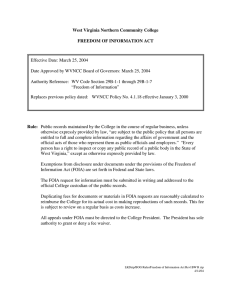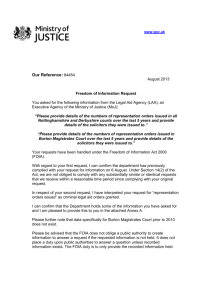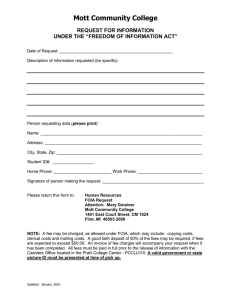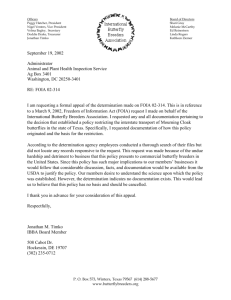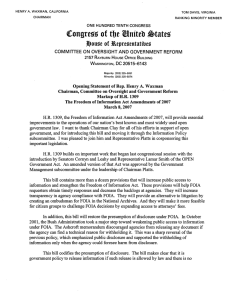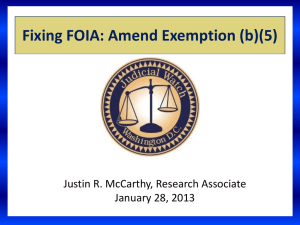Chapters 33-35
advertisement
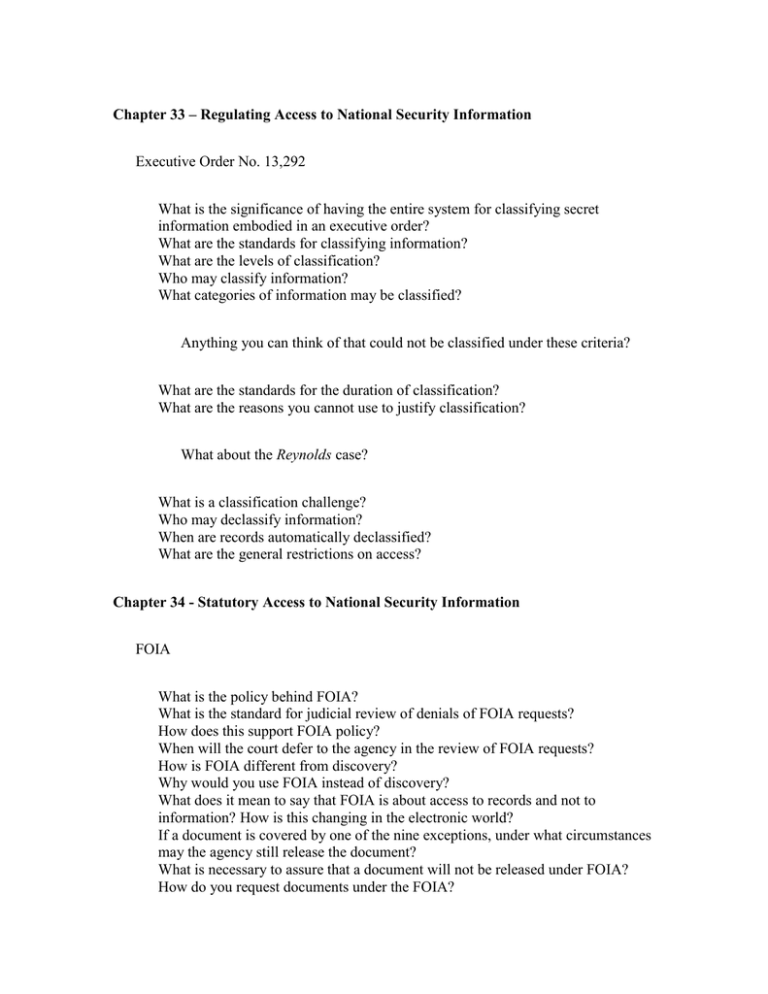
Chapter 33 – Regulating Access to National Security Information Executive Order No. 13,292 What is the significance of having the entire system for classifying secret information embodied in an executive order? What are the standards for classifying information? What are the levels of classification? Who may classify information? What categories of information may be classified? Anything you can think of that could not be classified under these criteria? What are the standards for the duration of classification? What are the reasons you cannot use to justify classification? What about the Reynolds case? What is a classification challenge? Who may declassify information? When are records automatically declassified? What are the general restrictions on access? Chapter 34 - Statutory Access to National Security Information FOIA What is the policy behind FOIA? What is the standard for judicial review of denials of FOIA requests? How does this support FOIA policy? When will the court defer to the agency in the review of FOIA requests? How is FOIA different from discovery? Why would you use FOIA instead of discovery? What does it mean to say that FOIA is about access to records and not to information? How is this changing in the electronic world? If a document is covered by one of the nine exceptions, under what circumstances may the agency still release the document? What is necessary to assure that a document will not be released under FOIA? How do you request documents under the FOIA? 2 What is a Glomar response and why is it necessary? What is reverse FOIA? (Chrysler case) What does Ex. Order 12600 require? Why is this critical to reverse FOIA protections? What is the Privacy Act and what does it allow you to do? How does it differ from FOIA? What if you find incorrect information about yourself? What are Sunshine Acts? What are the critical functions for meeting that trigger the Sunshine Act? How do sanctions for violating the Sunshine/Open Meetings acts differ between the states and the federal government? How do Moberg and FCC v. ITT differ in their definitions of meetings? How do agencies try to get around Sunshine acts? Ray v. Turner, 587 F.2d 1187 (DCC 1978) What is the standard from the Vaughn case? What are the four salient characteristics of de novo review in the national security context? When should judges use in camera review? Why did the court find that the CIA had not been responsive to the requirements of Vaughn and the statutory amendments? Bassiouni v. Central Intelligence Agency, 392 F.3d 244 (CA7 2004) What did the CIA make a Glomar response? Why did plaintiff say the CIA had waived its right to make this response? The Presidential Records Act What prompted the passage of this Act? What restrictions does it place on the records? Chapter 35 - Access to National Security Information in Civil Litigation Schwartz v. DOJ, 435 F. Supp. 1203 (1977), aff’d, 595 F.2d 888 (D.C. Cir. 1979) Is there a common law right to government held information? This is a limited exception to the general rule that there is no access to government information outside of statutory access. What common law right does the court find in US v. Mitchell? 3 Does this apply to all three branches? What are clear examples of public records? How does this differ from the reach of FOIA? Did the court find that there was a common law privilege to copy Congressional public records? What did the court say that Congress could do if it does not like this? Why doesn't the FOIA extinguish the common law right? National Security Studies v. United States Dept. of Justice, 331 F.3d 918 (D.C. Cir. 2003) Did this case accept the claim that public records were only judicial records? How did this case treat the conflict between the common law privilege and FOIA where both applied? What is the rationale for applying FOIA? Is this persuasive? Pentagen Technologies v. Committee on Appropriations, 20 F. Supp. 2d 41 (D.D.C. 1998) Request for congressional committee investigation reports Court found this was protected by the Speech and Debate Clause. Does this trump common law privileges? Does this limit Schwartz? Nixon v. Warner Communications, 435 U.S. 589 (1978) Attempt to get Nixon White House tapes What law governs access to presidential materials? Should this trump the common law privilege? How were records related to the Atlanta Olympics bombing and the Oklahoma City bombing treated differently? Why are the equities different for the Atlanta bombing? Are you convinced that the common law privilege is a useful tool in national security cases? What does Houchins v. KQED, Inc., 438 U.S. 1, 15 (1978) tell us about a 1st or 14th Amendment based right to government information? 4 Why factors does the court weigh in determining whether the media has access to criminal trials? What is the public policy argument for allowing media access? Nation Magazine v.US DOD, 762 F. Supp. 1558 (1991) What was the plaintiff's core claim? Why did the military limit media access to the battlefield after Vietnam? What does the court tell us about access to government meetings, not otherwise covered by Open Meetings Law? What about access to closed institutions such as prisons? What about streets and parks? What did the court say was the broader purpose of the 1st amendment? What is the problem with applying these concepts to military actions? Is the court willing to interfere with military decisionmaking on the battlefield? How did technology for covering wars and sending information home change from WWW to the First Gulf War? How does this change the balance of equities on allowing reporters battlefield access? Why? What is the technology today? How is this an issue for soldiers themselves? What about access to the hanger were the dead were unloaded from overseas? Why might the military want to block this access? Why is the military interested in shaping the coverage of wars? How does embedding of reporters inherently bias coverage in the military's favor? Should the court be concerned about this? Is this a presidential national security power? Do you think the military would try exercise the same control in a domestic emergency? North Jersey Media Group, Inc. v. Ashcroft 308 F.3d 198, CIR3 (2002), cert. denied, 538 U.S. 1056 (2003) What hearings did the plaintiffs want to attend? Is there an historical right of access to government proceedings generally? What proceedings was the court referring to? What about administrative proceedings? 5 While deportation hearings were theoretically open, how did the government routinely evade this? What is the logic prong of the Richmond Newspapers case? Is furthering an informed discussion enough - if this were the test, would there be any closed venues? What are the six ways the government argues that open deportation hearings will harm national security? Is there any way plaintiff can rebut this assertions? Any right to access? Detroit Free Press v. Ashcroft, 303 F.3d 681 (6th Cir. 2002) Basically the same facts as North Jersey Media How did the 6th Cir rule? - (Opposite of the result in North Jersey Media) Can these cases be reconciled? Did the United States Supreme Court accept cert in either case? Where does that leave us? Center for National Security Studies v. United States Dept. of Justice, 331 F.3d 918 (D.C. Cir. 2003) Plaintiffs want access to the names of 700+ detainees being held after 9/11. Why can't the detainees just have their counsel contact the plaintiffs? How did the court characterize the information plaintiffs sought? How does this characterization assure that there will be no access? The Case that didn’t exist: M.K.B. v. Warden, 540 U.S. 1213 (2004) Secret proceedings against a foreign national being detained by the government. How does keeping the whole proceeding secret thwart legal remedies for secrecy? Can the government order the lawyer to not tell anyone? Stay tuned for national security letters. Halkin v. Helms, 690 F.2d 977 (D.C. Cir 1982) Operation CHAOS case (Maxwell Smart, anyone?) Plaintiffs want to sue the CIA for damages for clandestine surveillance and dirty tricks What will plaintiffs need for discovery? What is the government’s claimed privilege to deny the discovery? 6 If you cannot get discovery, what happens to your case as a plaintiff? Where do we get the notion of a state secret? What are the Reynolds factors in identifying a state secret? What is the problem that plaintiffs have with the court’s review of these factors? Can the court actually look at the information in camera as it does in FOIA disputes? Plaintiff’s want a Vaughn list – don’t they get it? What is the CIA trump card in denying information about who did what? Why does this kill the lawsuit? Why does this tell us that the Valeria Plame affair was serious? Should the court consider the plaintiff’s need for the information? What does this affect? Does it change the standard for deferring to the government’s determination that the information is a state secret? United States v. Reynolds, 345 U.S. 1 (1953) CYA on an airplane crash Widows sued for torts, government raised state secret defense, court bought it Later turns out there were no secrets, the government was just covering up negligence Should this affect the value of Reynolds as precedent? What is the mosaic theory and why does it threaten undermine access to most information? Tenet v. Doe, 544 U.S. 1 (2005) Government reneges on retirement deal with spies Spies sue to get benefits What is the key state secret that the government will not disclose? What happened in Totten v. United States, 92 U.S. 105 (1876)? Spy for Lincoln sued for money owed on spying contract Court found that this was a secret agreement that could not be divulged Is Totten just part of the state secret privilege, or is it a separate and stronger privilege? 7 Absolute bar on divulging information about spies How is this different from a discrimination case brought by an acknowledged but clandestine employee? Could we have a super-secret court to hear these cases?
